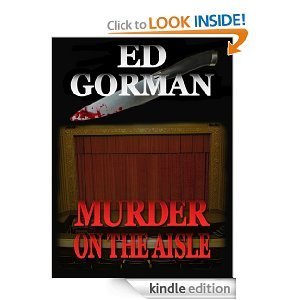Ed Gorman's Blog, page 164
April 7, 2012
Crime Wave (1954)
 Noir 101. The Essentials. Crime Wave.If this little policier from Warner Bros. (filmed in 1952, released in 1954) isn't part of your vocabulary then it needs to be; and considering it was finally released on DVD a few years ago, there's no excuse not to see it. Crime Wave doesn't stand out from a narrative point of view (despite a bucket of writers); the plot is routine, like a million other second features cranked out during the fifties. Although the story and characters are heavily steeped in noir tropes, it's André De Toth's sharp direction that sets it apart from other low budget crime pictures and demands that it be seen by any enthusiast. It can be argued that no other film noir is as influential as it is unknown.
Noir 101. The Essentials. Crime Wave.If this little policier from Warner Bros. (filmed in 1952, released in 1954) isn't part of your vocabulary then it needs to be; and considering it was finally released on DVD a few years ago, there's no excuse not to see it. Crime Wave doesn't stand out from a narrative point of view (despite a bucket of writers); the plot is routine, like a million other second features cranked out during the fifties. Although the story and characters are heavily steeped in noir tropes, it's André De Toth's sharp direction that sets it apart from other low budget crime pictures and demands that it be seen by any enthusiast. It can be argued that no other film noir is as influential as it is unknown.The story is old hat: Ex-con tries to go straight. His old crew breaks out of the Q and comes knocking. When he refuses to help, they hold his fresh new wife in order to force him to take part in one last caper. All the while, the cops are along for the ride, except they don't believe for a second that our boy is on the up and up.
The cast here is special, and although Sterling Hayden isn't (necessarily) the protagonist, he dominates the film. This is the sort of role the movie gods had in mind when they placed Hayden in front of a camera: LAPD Detective Lieutenant Sims, bigger and tougher than any hood in the mug book. For my money this is the role of Hayden's career — not the meatiest or the most well known, but the one in which he leaves the impression of having been the part, rather than merely having played it. (Put it another way: during the DVD commentary, author James Ellroy asserts that Hayden in Crime Wave simply is Bud White.) There are those that prefer him in The Asphalt Jungle or The Killing, but Hayden has a distinct vibe as a cop that isn't there when he's playing a crook: you can cross to the other side of the street and dodge a hoodlum (and it isn't like you won't see Hayden coming from a mile away) but you can't avoid the police. With the force of law behind him, the prospect of cop Hayden looking for you is scary as hell.
for the rest go here:(scroll down)ht http://www.noiroftheweek.com/search?u... tp://www.noiroftheweek.com/search?updated-...
April 6, 2012
Ruby Keeler by Jon Breen
April 5, 2012
Forgotten Books: Saturday Games by Brown Meggs
The novel was good enough to be nominated for a first novel Edgar and to go through a number of printings here and abroad. It's a dazzler. Three upper middle-class Southern California types have a little too much grass and booze fun with a gorgeous wild woman named Emjay (this was the early Seventies remember). A private pool, a lot of sex and...Emjay somehow gets herself murdered. Which of the three men is guilty? Or are all of them guilty? Or none of them guilty?
This is a real puzzler populated by real people. The hip cop Anson Freres spends the book getting to know a number of people he'd rather not brush up against but must in the line of duty. The SoCal background is wittily sketched. And the sex scenes are truly torrid. They're also proof that less is more. The novel is saturated with sexuality but there's not a hard core moment to be found.
Meggs went on to write several other novels. I've read Saturday three or four times since its original publication. It's the reading equivalent of watching a really good athlete on a really good day. The craft here is dazzling.
And Meggs' life was nearly as interesting as his books.
Brown Meggs
mystery writer
Born: 10/20/1930
Birthplace: Los Angeles
A successful executive for Capitol Records, Meggs was also a talented mystery writer. He was nominated for the Edgar Allan Poe Award for his first novel, Saturday Games (1974). His other books include The Matter of Paradise (1975), Aria (1978), and The War Train (1981). Though he specialized in classical music and opera, Meggs made his greatest coup for Capitol Records when he secured the rights to distribute Beatles albums in the United States.
Died: 10/8/1997
April 4, 2012
Howard Browne
If you were an adolescant science fiction-fantasy reader in the Fifties Howard was likely one of your favorite people. He edited both Amazing and Fantastic, the Ziff-Davis publishing twins that offered the kind of adventure sf only a teenager could love. Early in the decade he edited Fantastic when it was upscale with stories by Ray Bradbury, John Collier, Shirley Jackson, etc. But nobody bought it so Ziff-Davis ordered it back to its gaudy past--action stories with purple Venusians, lots of rays guns, hard-boiled interstellar dudes and innumerable lovely interstellar babes. I loved it. For five years those were my two favorite magazines. Later I'd learn that most of the stories I especially liked were by Robert Silverberg. Some of them hold up pretty well today.
Late in my teens I started reading Howard's "Halo" series of mysteries. They owed a lot to Chandler (he insisted they owed a lot to James M. Cain too) but eventually they got rolling on their own entirely. They are well worth reading. He was a good writer line by line and a much better plotter than Chandler.
I mention all this because when I began editing Mystery Scene one of my goals was to get Howard in the magazine. He was somebody I'd always wanted to meet (via phone). He ended up writing three or four pieces of his autobiography for us. He was a great storyteller and a prescient judge of character.
I probably talked to him fifteen times over the years, sometimes at length. A lot of the talk was pretty funny and pretty cynical on both our parts. But then one night he called to say that he wouldn't be finishing his autobiography for the magazine as planned. His wife had died and he said he would never write again. He said that one night he'd gotten out of bed and gone to the bathroom and when he came back a few minutes later she was dead.
He spent his final days in a nursing home. California people put on a big birthday party for him. I'm sure he got a hell of a kick out of it. A great guy, a fine writer.
Here's a long obituary by Jack Adrian no less.
Independent, The (London), Nov 15, 1999 by Jack Adrian
HOWARD BROWNE was that unusual beast, a writer who not only succeeded on both sides of the editorial desk, but who was equally at home in two quite disparate genres, hardboiled detective fiction and SF/ Fantasy. His fantasy, in particular, was of the swashbuckling kind, a million miles - or rather, bowing to the genre, a million light years - from his tales of mean streets, mainly written under his pseudonym John Evans (one of many: others included Lawrence Chandler and Lee Francis).
He successfully jumped media, too, as well as genres, turning, when the pulp magazines began to wither and die in the early 1950s, from writing punchy, riveting prose to creating compelling screen- and tele-plays. And, like all able fictioneers, even at an advanced age he could still turn disaster into triumph - two rejected screenplays, "The Violent World of Jake Lingle" and "A Bowl of Cherries", upon which he had lavished much care and attention, he transformed into a brace of fine late (very late: he was then in his mid-eighties) novels, Pork City (1988) and the hilarious Scotch on the Rocks (1991).
Howard Browne was born in Omaha, Nebraska, the son of a baker, in 1908, and began his education in Lincoln, Nebraska. However, he dropped out of high school and rode the rails (i.e., hid in the boxcar) to Chicago to seek his fortune. He worked as a legman, or stringer, for a local newspaper before, at the age of 21, securing a post as department-store credit manager, a position he held for over a decade and which gave him an unparalleled insight into the psyche of his fellow men.
for the rest go here: http://findarticles.com/p/articles/mi...
April 3, 2012
FREE ED GORMAN NOVEL ON KINDLE MURDER ON THE AISLE

Share your own customer images[Kindle Edition]Ed Gorman (Author)Be the first to review this item | Like(2)Digital List Price:$2.99 What's this?
 Kindle Price:$0.00 includes free wireless delivery via
Amazon Whispernet
You Save:$2.99 (100%)Ed here: This is a novel I wrote in the
Kindle Price:$0.00 includes free wireless delivery via
Amazon Whispernet
You Save:$2.99 (100%)Ed here: This is a novel I wrote in thelate 1980s. It's a light serio-comic look at a TV critic teamala Siskel and Ebert. I sent a copy to Roger whom I'd known in my teens and twenties and he said "Thanks for killing the right one."
"A thoroughly professional piece of work, laced with touches of wry humor."--The New York Times
"A cleverly conceived whodunit featuring a cunning conclusion." Booklist"Skillfully crafted and full of insider touches about movie criticism and city life." Globe & Mail (Canada)"Enormously diverting...The only bad feature of the book is that's just 160 pages long, which should leave many readers wanting more." -Newsday.
Don't have a Kindle? Get your Kindle here.
"If Ed Gorman's name doesn't eventulaly become as famous as that of Lawrence Sanders, it's an unjust world. His work is fresh, polished, excitingly paced, thoroughly entertaining - and has something to say about the way we live, the way we are, and what we wish we were." -- Dean Koontz
ABOUT THE AUTHOR
Ed Gorman is an award winning American author best known for his crime and mystery fiction. He wrote The Poker Club which is now a film of the same name directed by Tim McCann.
He has written under many pseudonyms including "E. J. Gorman" and "Daniel Ransom." He won a Spur Award for Best Short Fiction for his short story "The Face" in 1992. His fiction collection Cages was nominated for the 1995 Bram Stoker Award for Best Fiction Collection. His collection The Dark Fantastic was nominated for the same award in 2001.
FIND MORE BOOKS FROM ED GORMAN AND CROSSROAD PRESS FOR YOUR KINDLE - including the popular Jack Dwyer Mysteries, The Robert Payne Mysteries, Cast on Dark Waters written with Award-Winning Author Tom Piccirrilli, and much much more. Crossroad Press is proud to deliver quality mysteries from such authors as Bill Crider, John Lutz, Bill Pronzini, Tom Piccirilli, and others - as well as Horror, Sci-Fi, Fantasy, Romance, Biographies, Young Adult fiction and much more. Just search the Kindle Store for Crossroad Press.
April 2, 2012
Collaborating with Max and Barb Collins
Antiques Chop TalkMarch 27th, 2012 by Max Allan Collins
Right now I am in the home stretch of my draft of ANTIQUES CHOP, the seventh "Trash 'n' Treasures" mystery that Barb and I have collaborated upon. I should finish this week (and I better, because April 1st is the deadline) (no fooling). Nate suggested that, while I'm in the midst of it, I provide a behind-the-scenes glimpse at the process.
Barb and I begin with a succession of business lunches where we first come up with the basic concept, and usually tie it to a title. The pattern of the titles are to have the word ANTIQUES followed by a punning word, and we have a list of these (continually growing). This time the title ANTIQUES CHOP sparked the premise (sometimes it's the other way around), leading to the mystery revolving around an ax murder, an unusually gruesome crime for a supposed "cozy."
We often look at "antique" crimes, which is to say crimes that occurred decades ago but are having latter-day ramifications. So I suggested we make an unsolved Lizzie Border-esque ax murder the centerpiece of the story, and wrote a faux entry about the crime for a non-existent true-crime encyclopedia. From there Barb and I began the back-and-forth process of coming up with a fairly detailed plot. We have to turn in a sample chapter and brief synopsis to our editor at Kensington (and get approval), so we have to have a firm idea of where we're going before Barb gets started on her draft.
Barb works on that draft for probably six months, although that six months may stretch out to an entire year, because she isn't always working on it – summers tend to be busy and that keeps her away from the work. Last year, for example, we went on a west coast book tour, plus there's comic con and other distractions.
As Barb writes, I stay out of her way unless she has a problem or a concern about what she's up to. Sometimes we discuss a plot point, and oftentimes we discuss it if she feels she has a need to deviate from the plot as originally conceived. Generally, though, I give her all the space she needs.
When Barb delivers her draft, it's usually about 200 to 225 pages of doubled-spaced copy. My job is to expand and flesh out her draft, providing more dialogue and even more humor and generally apply what I laughingly think of as a more professional gloss. The end result will be 300 to 330 pages. I do my pass in a month or less, working hard and intensely, with Barb editing and suggesting revisions as I go (she reads it, and provides her notes, a chapter at a time). We do a lot of this over business lunches – just yesterday, on what was otherwise a day off, we discussed two plot points that needed shoring up in the chapter I just finished and the one that I will be doing today.
The final step is for me to spend a day or two re-reading the manuscript and marking up a hard copy with revisions, with Barb entering them in the chapter files. Then, common to all writers, we ship it (by e-mail these days) and hold our collective breath, hoping for a delighted response from the editor. On this series, we've been lucky to get that response pretty much every time. Occasionally there are rewrites, as on ANTIQUES MAUL where the editor felt the murder occurred too late in the mystery, and we reshaped the book so that it happened virtually on page one and then flashed back.
I said "final step" above, but of course there is much more to do – there will be a copy-edited manuscript to check, and at least one round of galley proofs. We tend to trade off on these assignments, with Barb doing the copy-edited manuscript and me reading the galley proofs. We divide the work that way because (a) I hate the copy-editing stage, since the Moriarty of my career is the Intrusive Copy Editor Who Stalks Me Under Various Names and Guises, and (b) Barb is thoroughly sick of the book by the galley proof stage and is content to leave that step to me.
Do we squabble? Not much. Hardly at all. I may get testy if, as I'm moving forward in my draft, Barb indicates (and she's always right) that I need to go back and make a few fixes in a chapter that I had considered finished. This occurs, on the rare occasion that it does occur, early in the morning before I have had a chance to become fully human. Let's just say, first thing in the morning, I'm more Quarry than Mallory.
So there you go. That's how this particular flavor of sausage is made.
A Bitter Veil by Libby Fischer Hellmann
 By Derek Gunn
By Derek Gunn
It all began with a line of Persian poetry…
Libby Fischer Hellmann has been writing professionally since 2002 and is well-known for her Ellie Foreman and Private Investigator Georgia Davis series of books. She is co-founder of Fischer Hellmann Communications, which specializes in video production, speech writing, and spokesperson training. In A BITTER VEIL, Libby's prose flows, her characters breathe, and readers will find themselves flicking through the pages and spending more time than they had planned riveted to the book. A number of reviewers said A BITTER VEIL is a significant departure from Libby's usual books, and it most certainly is.
A BITTER VEIL is a novel of love, revolution, and how culture can force people together and rip them apart with ruthless abandon. The book is well-researched, and the people and the geography come alive. Culture, religion and politics all feature heavily but only serve to impact characters' views or actions.
The book introduces us to students Anna Schroder and Nouri Samedi. Anna meets Nouri while browsing a bookshop. The immediate magnetism between them flourishes over their next few years at college. While the author fleshes out her characters and we see their love blossom, we also get hints of the disintegration of the Shah's regime in Iran. While we see two people very much in love, we are shown hints of their cultural differences. In between getting involved in meetings with other students regarding the changes in Iran, we see their relationship mature, rock a little and finally cement to the point that Nouri asks Anna to marry him and come to Iran.
Their lives begin in Iran in a wild flurry. Anna struggles to find her place in a new culture where her privileged position in Iranian society allows her to see only the sparkling veneer of the modern Iran. However, Iran is a country going through a tumultuous time. This is 1978, the Shah is deposed, and the Islamic Republic rises from the ashes of revolution. Soldiers walk the streets and demonstrations are ruthlessly dealt with.
Anna finds her life drastically changed as Ayatollah Khomeini comes to power. Her western ideals are stretched to their limit and her freedom is just one of the things she will lose. But that is not the worst surprise that will tear her life apart.
April 1, 2012
New Books-Three A.M. Steven John

Steven John
3/30/12
My first novel, Three A.M., was published on March 27th. That was three days ago as I type these words. It still seems rather surreal to me, frankly. Three days ago I found myself addressing a few dozen people at a Barnes & Noble where heretofore I had frequently purchased books (and other sundries) but now was speaking about my own novel and seated between a poster of its cover and a stack of copies.
I had prepared a few remarks (for example I had thought through a comment that turned out to be fitting about sharing with those gathered a moment I knew I would never forget) but planned to speak mostly off the cuff. Which I did, and I believe I convinced people that I had done much more preparation than was the case.
In fact, within a few minutes of stepping up to the podium I felt quite at home talking about the book itself and the years of work and waiting that had come between my typing its first words in 2009 and the release date in 2012. Indeed there was only one moment when I found myself the proverbial deer in the headlights.
From the back of the audience, a gentleman (a man I did not know—much of those gathered were friends and family) raised his hand and asked: "What themes inform your writing?"
I nodded, a knowing smile on my pursed lips while thinking: "Oh… shit." It was a simple yet astute question, and one which, I quickly realized, I had never really thought about. For what felt like a long while but what was likely only a few blinks (amazing how fast the mind can work, even if its labors are fruitless, no? This time I think I pulled through OK, though. You'll see sometime after I end this protracted parenthetical) I stood silently, then I felt a breath coming in and then it was turning around and vocal chords were vibrating within me and I said "Good and evil."
Then I paused again, weighing whether to run with it or cut my losses and take a different question. I ran with it. And despite never having consciously considered theme while writing Three A.M., I think just maybe good old Good and Evil was the right answer. I went on speaking and described how in many ways the book's protagonist, Thomas Vale, is a perfect antihero-cum-hero when viewed through the lens of the hero's journey, when compared to mythological figures, etc. He lives in a dark world (metaphorically and in practice) peopled by shady if not outright evil people and informed by self-service if not outright corruption. And when tested, Vale rises up and fights back against the evil, ready to prevail or die.
Is he not Theseus emerging from Hades? A Norseman of legend emerging from the depths of winter? Or… something more cogent? Don't worry, I didn't ramble on with specific examples. Rather I spoke of the simple yet universal concept of what happens when Good meets Evil and I explained how, at least on a subconscious level, that was the way in which this book and its protagonist came to life. I had an idea for a setting—a world enshrouded by thick, unending fog—and wanted to set a story in it. Once I had a character in mind and the loose arc of the story, I simply asked (repeatedly, in a variety of situations and in dealing with a range of people) "What would this man do?" Thus he became ever more "real" and thus he could navigate his way through the world, creating the story.
And as I thought about it while standing at that lectern on Tuesday and as I dwell on it at more length now, that simple question really is the most important one of all: When a given situation arises, What Will You Do?
In the case of Tom Vale and his experiences in Three A.M.—contrary to what Vale would likely have thought himself capable of doing—when evil (or adversity or corruption) confronts him, he fights back. We would all like to think of ourselves as ones who would do the same, but fortunately for us, we are seldom tested.
March 31, 2012
The Great Mark Evanier on The Three Stooges
 Ed here: One of my all time favorite writer-bloggers Mark Evanier talks about the apprehension of some Stooges fans feel about the upcoming Stooges film. As a Stooge maniac myself I'm with Mark. Nothing than "ruin" the Stooges.
Ed here: One of my all time favorite writer-bloggers Mark Evanier talks about the apprehension of some Stooges fans feel about the upcoming Stooges film. As a Stooge maniac myself I'm with Mark. Nothing than "ruin" the Stooges.Knuckleheads on ParadePublished Thursday, March 29, 2012 at 5:08 PM
In the last few weeks, I've had pretty much the same conversation with at least three separate friends...not the guys in the above photo but about them. There's a new movie coming out in which current actors portray the Three Stooges and these Stooge fans are worried it will sully the good name of Stooge. My attitude in response is like, "Really? You're concerned about the dignity of the Three Stooges?" I submit that if you think the Three Stooges ever had any dignity to lose, you don't "get" the Three Stooges.
Did the Three Stooges ever turn down a script? Did Moe ever say to their director, "My character wouldn't say that"? More to the point, did Larry ever say, "No, Moe wouldn't hit me with one of those"?
I knew Larry a bit. I briefly met Moe Howard, Joe Besser and "Curly" Joe DeRita but I spent a few hours of quality time with Larry Fine when he was living in the Motion Picture Country Home. If you mentioned one of their films to him by name, he'd display no recognition of the title but he might wonder aloud, "Is that the one where Moe hit me with the tire iron?" Oddly enough, I hear Dame Judith Dench asks the same thing if you quiz her about anything by Shakespeare.
I've told this before here but one of the saddest/strangest things I ever saw on a TV news show occurred the day Larry died. The local CBS crew rushed cameras over to Moe's house and interviewed him on his front lawn. Moe was crying and his lower lip was trembling so much, his mouth was literally out of sync with his own voice. He was sobbing and saying, "He was my best friend...he was like a brother to me...I loved him so." And as he was saying this, they began rolling footage of Moe smashing pottery over Larry's head, running a saw across his skull and ripping out handfuls of Larry's hair.
I loved the Three Stooges. I still love the Three Stooges. I will always love the Three Stooges and there's no movie anyone can make that will change that.
And one of the things I love about them is that they had absolutely no standards. They would do anything, anything. You know how freedom's just another word for nothing left to lose? Well, those guys were as free as a human being in show business could be. They had no standards to live up to or even down to. Someone would say to Moe, "Hey, how about in the next scene, you drop your pants, then stick your brother's nose in a light socket and electrocute him?" and Moe would just ask, "Okay, which side should I be on?"
for the entire piece go here:www.newsfromme.comMarch 30, 2012
Forgotten Books: Loan Shark by J.W. O'Dell

--------------------------LOAN SHARK
Ed here: By accident I ran across this blog called Olman's Fifty and it turned out to be one of the most fascinating review blogs I've ever read. He covers everything from pulp to literary novels. What made me a fan immediately was his review of the following novel. I've quoted Terry Southern before who always talked about all the great and sometimes memorable trash that could be found at the bottom of the literary totem. Belmont-Tower was certainly at or near the bottom but every once in awhile they did manage to publish a decent book---in fact so many it might surprise you. I read this when it first appeared and have a read it once or twice since. This is dark bleak pulp at its mordant agitated best. I don't know who O'Dell was (for a time I thought he might be Peter McCurtin who worked and published there and it still might be) but he gave a minor book bitter and truthful life.
Tuesday, March 27, 2012
Phew! Well this turned out to be an excellent antidote to that terrible Butcher novel I read before. Right from the beginning, I could tell we were in a different level of quality with Loan Shark. The writing is taut and the setting's grime, squalor and desperation of 1970s Times Square feels very real.
The story starts in medias res as deadbeat gambler and alcoholic Joey Casey loses all his bets in his last big play. He is in deep to a shylock and not just any shylock, but one of the meanest and least compromising, Macaluso. Worse, he drunkenly talked shit about Macaluso and even mocked his retarded daughter. So Macaluso's two top goons, old pros Fine and Demera, are after him and it's quite possible that this time they'll take his life.
for the rest go here: Olman Feelyus
http://olmansfifty.blogspot.com/
Ed Gorman's Blog
- Ed Gorman's profile
- 118 followers



